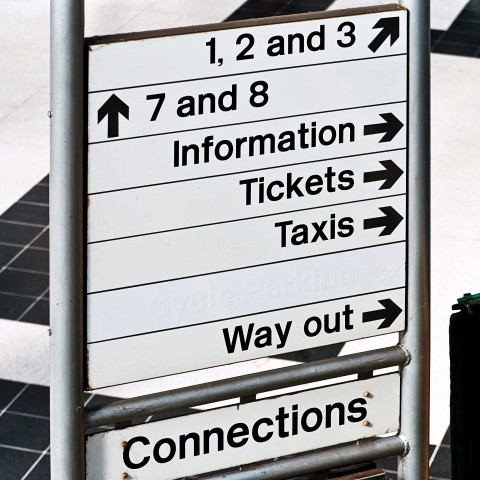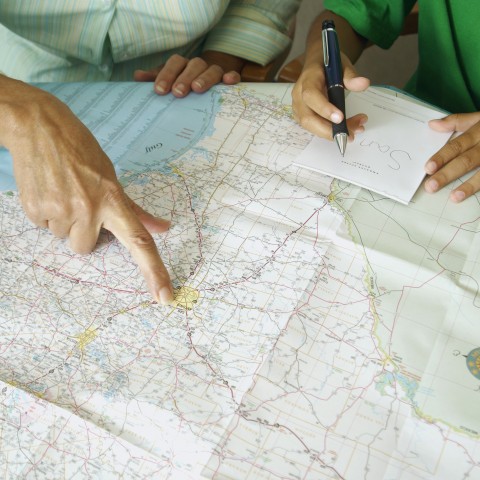
Ever wondered how to say “north” or “south” in Greek?
Or how about asking for some directions in Greek or providing them?
Getting around a new and unfamiliar city such as Athens, or even a small island, can be tricky. But in Greece, kind-hearted and welcoming people are always eager to help you find exactly what you’re looking for!
Although the majority of Greek people speak English at a conversational level, it’s always good to know the basics.
In this blog post, we’ll present you with some of the most popular words and ready-to-use phrases, as well as useful examples, so you can learn everything you need to know about asking for or giving directions in Greek.

Table of Contents
- Directions on the Map
- Directions on the Road
- Important Places and Landmarks
- Must-Know Phrases for Asking for Directions
- Must-Know Phrases for Giving Directions
- Example Dialogue for Asking and Providing Directions in Greek
- Conclusion
1. Directions on the Map

The position of Greece on the map is characterized by many as strategic. This is no surprise, as Greece is located at the crossroads of Europe, Asia, and Africa.
Let’s have a look at some of the most important Greek words for describing a place on the map. Knowing the cardinal directions in Greek will be of great help as you try to navigate the area you’re in.
– ο βορράς (o vorás) — “the north” [noun]
Example:
- Greek: Η Σουηδία βρίσκεται στον βορρά.
- Romanization: I Suidía vrískete ston vorá.
- Translation: “Sweden is in the north.”
– βόρειος (vórios) — “northern” [adjective]
Example:
- Greek: Ο βόρειος άνεμος είναι κρύος.
- Romanization: O vórios ánemos íne kríos.
- Translation: “The northern wind is cold.”
– βόρεια (vória) — “north” [adverb]
Example:
- Greek: Βόρεια της Ελλάδας βρίσκεται η Βουλγαρία.
- Romanization: Vória tis Eládas vrískete i Vulgaría.
- Translation: “North of Greece lies Bulgaria.”
Similarly, you can use all of the compass directions in Greek as follows:
- Greek: o νότος [noun]
- Romanization: o nótos
- Translation: “the south”
- Greek: νότιος [adj.]
- Romanization: nótios
- Translation: “southern”
- Greek: νότια [adverb]
- Romanization: nótia
- Translation: “south”
- Greek: η ανατολή [noun]
- Romanization: i anatolí
- Translation: “the east”
- Greek: ανατολικός [adj.]
- Romanization: anatolikós
- Translation: “eastern”
- Greek: ανατολικά [adverb]
- Romanization: anatoliká
- Translation: “east”
- Greek: η δύση [noun]
- Romanization: i dísi
- Translation: “the west”
- Greek: δυτικός [adj.]
- Romanization: ditikós
- Translation: “western”
- Greek: δυτικά [adverb]
- Romanization: ditiká
- Translation: “west”
- Greek: βορειοανατολικός [adj.]
- Romanization: vorioanatolikós
- Translation: “northeastern”
- Greek: βορειοανατολικά [adverb]
- Romanization: vorioanatoliká
- Translation: “northeast”
- Greek: βορειοδυτικός [adj.]
- Romanization: vorioditikós
- Translation: “northwestern”
- Greek: βορειοδυτικά [adverb]
- Romanization: vorioditiká
- Translation: “northwest”
- Greek: νοτιοανατολικός [adj.]
- Romanization: notioanatolikós
- Translation: “southeastern”
- Greek: νοτιοανατολικά [adverb]
- Romanization: notioanatoliká
- Translation: “southeast”
- Greek: νοτιοδυτικός [adj.]
- Romanization: otioditikós
- Translation: “southwestern”
- Greek: νοτιοδυτικά [adverb]
- Romanization: notioditiká
- Translation: “southwest”
Example:
- Greek: Η Ελλάδα βρίσκεται στη νότια Ευρώπη. Πιο συγκεκριμένα, βρίσκεται δυτικά της Τουρκίας, νότια της Βουλγαρίας, νοτιοανατολικά της Αλβανίας και ανατολικά της Ιταλίας.
- Romanization: I Eláda vrískete sti nótia Evrópi. Pio singekriména, vrískete ditiká tis Turkías, nótia tis Vulgarías, notioanatoliká tis Alvanías ke anatoliká tis Italías.
- Translation: “Greece is located in southern Europe. More specifically, it is located east of Turkey, south of Bulgaria, southeast of Albania, and east of Italy.”
As you might have noticed, you can choose to use either the appropriate noun, adjective, or adverb, based on the context of each sentence. However, you should pay attention, because there’s a high risk of confusion.
Our suggestion is that you write down many examples to familiarize yourself with each.
2. Directions on the Road

Getting around on the road, though, might be more useful during your trip in Greece. Therefore, we’ve gathered here all the basics on this subject.
- Greek: μπροστά
- Romanization: brostá
- Translation: “front”
- Greek: πίσω
- Romanization: píso
- Translation: “back” / “behind”
- Greek: αριστερά
- Romanization: aristerá
- Translation: “left”
- Greek: δεξιά
- Romanization: dexiá
- Translation: “right”
Example:
- Greek: Το σούπερ μάρκετ είναι πίσω από το ταχυδρομείο και αριστερά από την τράπεζα.
- Romanization: To súper márket íne píso apó to tahidromío ke aristerá apó tin trápeza.
- Translation: “The supermarket is located behind the post office and on the left of the bank.”
Other useful location-related words can be found below:
- Greek: κοντά
- Romanization: kondá
- Translation: “near”
- Greek: μακριά
- Romanization: makriá
- Translation: “far”
- Greek: μακριά από
- Romanization: makriá apó
- Translation: “away from”
Example:
- Greek: Πόσο μακριά είναι το μετρό από το ξενοδοχείο;
- Romanization: Póso makriá íne to metró apó to xenodohío?
- Translation: “How far away is the metro from the hotel?”
As you might have noticed, many location-related adverbs are accompanied by the word από. This corresponds to the English word “from,” so you can add it when you feel it’s appropriate.
- Greek: δίπλα (σε / στον / στην / στο)
- Romanization: dípla (se / ston / stin / sto)
- Translation: “next to”
- Greek: απέναντι από
- Romanization: apénandi apó
- Translation: “across the street from”
- Greek: στη γωνία
- Romanization: vsti gonía
- Translation: “at the corner”
- Greek: στη διασταύρωση
- Romanization: sti diastávrosi
- Translation: “at the intersection”
Example:
- Greek: Το νοσοκομείο βρίσκεται δίπλα στο σούπερ μάρκετ και απέναντι από το ταχυδρομείο. Πιο συγκεκριμένα, βρίσκεται ακριβώς στη γωνία της διασταύρωσης.
- Romanization: To nosokomío vrískete dípla sto súper márket ke apénandi apó to tahidromío. Pio singekriména, vrískete akrivós sti gonía tis diastávrosis.
- Translation: “The hospital is located next to the supermarket and across the street from the post office. More specifically, it is located at the corner, right at the intersection.”
3. Important Places and Landmarks

In this section, you’ll find some of the most important places and landmarks in Greek towns. These words can be used to enhance your knowledge on giving and receiving directions.
- Greek: αεροδρόμιο
- Romanization: aerodrómio
- Translation: “airport”
- Greek: μετρό
- Romanization: metró
- Translation: “metro” / “subway”
- Greek: το κέντρο της πόλης
- Romanization: to kéndro tis pólis
- Translation: “the center of the city”
- Greek: πάρκο
- Romanization: párko
- Translation: “park”
- Greek: ξενοδοχείο
- Romanization: xenodohío
- Translation: “hotel”
- Greek: νοσοκομείο
- Romanization: nosokomío
- Translation: “hospital”
- Greek: τράπεζα
- Romanization: trápeza
- Translation: “bank”
And here are some more important words to get around at ease during your holiday or vacation.
- Greek: τουαλέτα
- Romanization: tualéta
- Translation: “restroom”
- Greek: φανάρια
- Romanization: fanária
- Translation: “traffic lights”
- Greek: ασανσέρ
- Romanization: asansér
- Translation: “elevator”
4. Must-Know Phrases for Asking for Directions

We couldn’t omit some ready-to-use phrases about how to ask for directions in Greek. You can practice using these, or you can transform them and create similar sentences on your own by mixing and matching all of the words you’ve learned so far.
- Greek: Συγγνώμη, μπορώ να κάνω μια ερώτηση;
- Romanization: Signómi, boró na káno mia erótisi?
- Translation: “Excuse me, may I ask something?”
- Greek: Πού είναι η τουαλέτα;
- Romanization: Pu íne i tualéta?
- Translation: “Where is the restroom?”
- Greek: Πώς μπορώ να πάω στο σούπερ μάρκετ;
- Romanization: Pos boró na páo sto súper márket?
- Translation: “How can I get to the supermarket?”
- Greek: Πόσο μακριά είναι η παραλία;
- Romanization: Póso makriá íne i paralía?
- Translation: “How far is the beach?”
- Greek: Σας ευχαριστώ πολύ!
- Romanization: Sas efharistó polí!
- Translation: “Thank you very much!” (Politely in plural)
- Greek: Ευχαριστώ για τη βοήθεια!
- Romanization: Efharistó ya ti voíthia!
- Translation: “Thanks for the help!”
5. Must-Know Phrases for Giving Directions

It’s not always about asking for directions, though. There can be situations where you need to give someone directions, for example to a taxi driver.
Take a look at some more ready-to-use phrases, which can be used to give directions.
- Greek: Συνεχίστε ευθεία.
- Romanization: Sinehíste efthía.
- Translation: “Keep going straight ahead.”
- Greek: Κάντε αναστροφή.
- Romanization: Kánde anastrofí.
- Translation: “Make a U-turn.”
- Greek: Στρíψτε δεξιά / αριστερά.
- Romanization: Strípste dexiá / aristerá.
- Translation: “Turn right / left.”
- Greek: Θα πάτε στον τρίτο όροφο.
- Romanization: Tha páte ston tríto órofo.
- Translation: “You should go to the third floor.”
- Greek: Συνεχίστε.
- Romanization: Sinehíste.
- Translation: “Keep going.”
- Greek: Βιαστείτε, παρακαλώ.
- Romanization: Viastíte, parakaló.
- Translation: “Hurry up, please.”
- Greek: Πιο αργά, παρακαλώ.
- Romanization: Pio argá, parakaló.
- Translation: “Slower, please.”
6. Example Dialogue for Asking and Providing Directions in Greek

While taking a ride in a taxi…
Greek:
A: Καλησπέρα σας, θα ήθελα να με πάτε στο Ξενοδοχείο Μαρία, παρακαλώ.
B: Καλησπέρα! Που ακριβώς βρίσκεται το ξενοδοχείο;
A: Είναι στην οδό Ηλία Βενέζη 15, δίπλα από το σούπερ μάρκετ Βασιλόπουλος. Απέναντί του βρίσκεται η Εθνική Τράπεζα.
B: Ωραία, κατάλαβα, σας ευχαριστώ.
Romanization:
A: Kalispéra sas, tha íthela na me páte sto Xenodohío María, parakaló.
B: Kalispéra! Pu akrivós vrískete to xenodohío?
A: Íne stin odó Ilía Venézi dekapéde, dípla sto súper márket Vasilópulos. Apénadi tu vrískete i Ethnikí Trápeza.
B: Oréa, katálava, sas efharistó.
Translation:
A: “Good afternoon, I would like you to take me to Maria Hotel, please.”
B: “Good afternoon! Where exactly is the hotel?”
A: “It is on Ilia Venezi street number 15, next to the supermarket Vasilopulos. Across the street from the National Bank.”
B: “Great, I get it, thank you.”
7. Conclusion
Asking for directions while wandering around can save you time and lots of meters of walking distance. In this article, we tried to make it easier for you to ask for directions, or even provide some.
If you feel like studying some more, here’s our article on Popular Greek Travel Phrases.
GreekPod101.com offers you high-quality, practical knowledge about the Greek language.
At GreekPod101.com, we aim to provide you with everything you need to know about the Greek language in a fun and interesting way. Articles like this one, word lists, grammar tips, and even YouTube videos are waiting for you to discover them! You can even delve into a one-on-one learning experience with your own personal Greek teacher upon subscription to Premium Plus!
In the meantime, can you think of any other phrase related to directions that we haven’t included in this article? Let us know in the comments!










